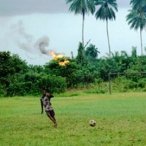
22 de noviembre de 2010 | Noticias | Derechos humanos | Industrias extractivas
The Ogoni Struggle Lives on
Leaked documents reveal Shell’s strategy when accused of murder in Niger Delta
Length: 04.34
Descargar: MP3 (3.1 MB)
Secret Shell documents leaked to the media reveal the British-Dutch company’s “crisis management” strategy when accused of the murder of Nigerian activist Ken Saro Wiwa in 1995. Shell’s plans to influence the media, especially the BBC, and to cause divide among non governmental organizations, have just been published.
Shell files, made public by British newspaper The Guardian, describe the company’s strategy and plan of action. The strategy was agreed by Shell’s top executives in a secret meeting held in Ascot, England, in January of 1996. There, they analyzed leaving Nigeria, changing its name to “New Shell”, to avoid the “bad publicity” of the time. Until now, the documents were highly confidential.
Ken Saro Wiwa was one of the activists murdered by the Nigerian dictatorship in 1995. He was hanged on November 10th of that year. He was a renowned poet. In 1990 he founded the Movement for the Survival of the Ogoni People, created to protest against the pollution of Ogoni territories by oil corporations in the Niger Delta.
Oil spills and gas flaring in Nigeria, especially by Shell, have been one of the world’s largest expressions of oil pollution.
Saro-Wiwa led the protests and was the spokesperson of the resistance against Shell. So he was persecuted and arrested several times, until the government sentenced him to death by hanging under fake charges of murder, with no right to defense.
Shell was pinpointed as accomplice of the Nigerian dictatorship in Saro-Wiwa’s conviction and accused by different sectors, with the support of international organizations. In fact, the families of the activists murdered in 1995 filed a lawsuit against Shell. As part of this trial, the company was forced to pay 15.5 million USD in compensation in June of 2009. In mid 2010 Shell refused to provide new information about oil leaks in its pipelines in the Niger Delta.
The Guardian reports that Shell’s secret documents of 1996 show a tactic of “divide and rule” to work with some sectors that questioned the company and in order to isolate others. The files speak of the “creation of coalitions, isolation of the opposition and changing the debate”.
The Body Shop, Greenpeace and Friends of the Earth were seen by Shell as organizations unlikely to change their position. One proposed tactic to counter them was to “challenge [the] basis on which they continue their campaign against Shell in order to make it more difficult for them to sustain it”. Human rights organizations such as Amnesty International and Human Rights Watch were seen as more easily persuaded. The document suggests building relationships with the organizations.
Shell’s 1996 documents complain that the media was so willing to report the views of pressure groups. It wanted to generate media coverage showing “ ’the other version’ of events”. Shell specified which media outlets
it should work with. It said that "stable relationships" had already been established with the Financial Times, Daily Telegraph, Times, and the Independent.
The BBC was one of the organizations singled out by Shell. One of the documents reveal that “relationships are underdeveloped” with the BBC. So the document reads: “We will identify and cultivate important editorial and senior management staff through a contact programme.” In particular they wanted to “build a relationship” with journalist Hilary Andersson, who had recently become the BBC’s Lagos correspondent.
Ken Saro Wiwa’s struggle does not stop. He is still giving Shell a hard time 15 years after his death. Before his murder and from prison he wrote a plea, which was silenced by the dictatorship: “In my innocence of the false charges I face here, in my utter conviction, I call upon the Ogoni people, the peoples of the Niger delta, and the oppressed ethnic minorities of Nigeria to stand up now and fight fearlessly and peacefully for their rights. History is on their side. God is on their side”.
Photo: Friends of the Earth International








